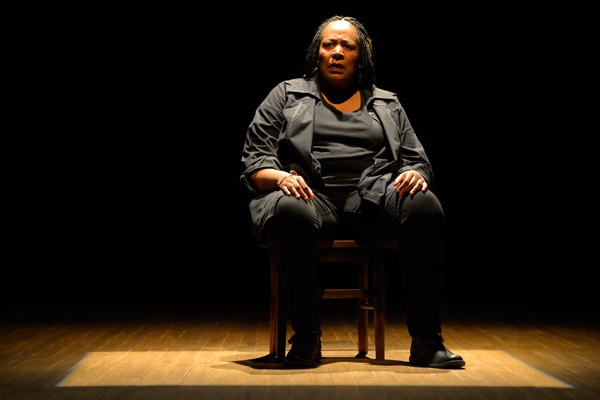
The first thing to know about Dael Orlandersmith's Black n Blue Boys/Broken Men is that there is no intermission. The one-woman show, based on Orlandersmith's experience working as a social worker in shelter in New York in the 1980s, is split into six characters, each with a different story of abuse—including a monologue from the perspective of a child molester. Our culture editors Emmet Sullivan and Elly Fishman attended the press opening on Sunday. The 90-minute show runs through October 28; tickets are available at goodmantheatre.org.
Emmet: Good morning! Have you recovered from last night yet?
Elly: Oof, it’s definitely a story that stays with you for a while.
Emmet: What did you think?
Elly: I'm of two minds. I think it's an important narrative to tell—and a really impressive project—but I actually was a little underwhelmed. I felt like it was a bit one-dimensional, I craved a little more humanity in each of the characters.
Emmet: Orlandersmith plays, if I recall correctly, six characters throughout the show: Mike, Flaco, Ian, Larry, Timmy, and Tenny. Am I forgetting anyone?
Elly: I thought she played children really well; I was less impressed with the adult characters.
Emmet: Is there one of the three adult storylines you especially didn't care for?
Elly: It's not one vs. another for me. It's the whole energy of the piece. It felt like an extended exercise—almost like a piece of reporting—rather than theater, but I don't want to be too harsh because I do think these stories are important. Like I said: two minds. What about you?
Emmet: Well, I enjoyed the show. I guess that's the best word for it. Even from the beginning, when Mike was setting the scene, and there were ambient noises around—that just immediately unsettled me. And like you, I think these are important stories to tell. I guess what confused me most was the story arc. I liked the character Larry, the "mayor of Central Park," but his vignette didn't really fit in with the others. And I also didn't like going from Flaco to Ian to Tenny back to Flaco. It took a moment to remember what Flaco's story was.
Elly: You know, I've spent quite a bit of time with kids very similar to some of her characters. That was the bulk of my reporting for "Pariahs Amid the Rainbow." And what's amazing about kids is their resilience and ability to find community and joy, and I felt like there was very little of that in Orlandersmith's representation. I also felt like she didn't give us that much new information about abuse. What I did think was amazing, though, is the way she represented a person's will to justify their situations. And in the case of the abuser, Tenny, how people will find a way to blame their issues on others—"they don't understand."
Emmet: Or with Flaco, how his father was so willing to turn a blind eye for the sake of preserving his family. Reading through the program, though, it sounds like the show brought new information to some viewers—namely, that it's possible for women to molest children as well. Orlandersmith says that was one of the most controversial pieces in the show.
Elly: Yeah, I agree that that's a more untold story.
Emmet: So this has been an evolving show—Orlandersmith workshopped it at Berkeley. If she were to continue tweaking it, is there one piece of advice you'd give?
Elly: I think there needs to be some joy in the play—as a relief, but also as a way to capture a more human landscape. I'm very curious about her source material.
Emmet: I think you're right, and the show could have been just as haunting even if one character found happiness after suffering abuse.
Elly: I just wonder whether these stories come from interviews, real experiences, or a conglomeration of stories because—and I hate to say it—some of the characters almost seemed like caricatures.
Emmet: As far as we know, they are fictional characters "partly inspired" by the people she counseled in a New York shelter back in the 80s. But we don't know what "partly inspired" entails.
Elly: I do think she did a good job of having an even hand—not victimizing or demonizing one character too much.
Emmet: Which made it that much harder for the audience to really hate any one character too much. The victims sometimes turned abusers; the molesters were able to defend their mindset.
Elly: Yeah, I mean no one character came out OK.
Emmet: Right.
Elly: And that's not always true… but maybe that's not the story she wants to tell.
Emmet: Well, the show runs for another three weeks right now, so I'm hoping more people weigh in on the story she does tell. It's an important, if imperfect, one.
Elly: I agree, and I do recommend that people go. It's an important piece to see, despite my criticisms.
Emmet: I hope you went home and watched the Nashville pilot like I did, causing major cultural whiplash.
Elly: Umm, three times.
Photograph: Kevin Berne/Goodman Theatre


